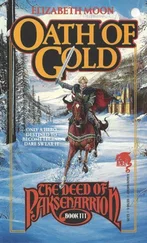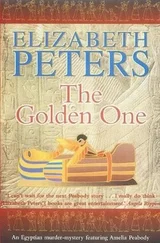There was one positive feature to the situation, though. Now I could dismiss my suspicions of Tony once and for all. His odd behavior over the phone had bothered me more than I had been willing to admit; I hadn’t even mentioned it to John, because I knew he’d pounce on it as further evidence of guilt. That was all explained by Tony’s news; he had been apprehensive about breaking the news of his engagement and (the conceited thing) ditto my poor heart, and he must have known I would react profanely and angrily to Ann’s loony experiment.
Tony stirred. “You’ve changed.”
“How?”
“You didn’t used to sulk.”
“I’m not sulking. I’m thinking.”
If I had been tempted to tell all to Tony and invite him to join the hunt, the news of his engagement had changed my mind. I had no right to push Ann’s fiancé into possible danger. He would expect to see something of me, though, even if he stayed at a hotel. Could I keep him amused and unaware for a few days, and then send him off to Turin unscathed and unsmirched? The answer was yes, probably, if nothing untoward occurred and if Schmidt kept his mouth shut and if John stayed far away from me.
In my absorption, I almost drove past the house. I pulled into my driveway with an abruptness that wrung a rude comment on my driving from Tony.
I ignored the comment. “Here we are. We’ll have a drink or two while you call hotels.”
Tony looked hurt. I ignored the look, too. It had been his idea to stay at a hotel, hadn’t it?
My house and its neighbors were part of the Wirtschafts-wunder —the economic rebirth of Germany after the Second World War. Not a distinguished part, however. Like corresponding developments in the United States, there were only two basic plans, endlessly repeated, to which the architects had added minor details in the hope (unfulfilled) of making the houses look different. My neighbor on the north had a bay window in the living room, my neighbor on the south had a bay window in the dining room. I had a front porch. It wasn’t much, just two walls with a roof on top and two teeny benches that nobody ever sat on.
Schmidt was sitting on one of the benches. If it hadn’t been for that damned porch, I’d have spotted him in time and passed on by. To make matters worse, he had swathed himself in bandages that covered his forehead from eyebrows to hairline.
“Ah,” he said, rising stiffly. “You have found him.”
I looked at Tony. “You called the Museum?”
“You were late,” Tony said sulkily. “I thought you’d forgotten. Grüss Gott, Herr Direktor . What the hell happened to you?”
“ Grüss Gott . I came,” Schmidt explained, “because I was concerned about you, Vicky. You were not in your office, you did not answer your telephone; and after what happened yesterday—”
“Never mind,” I said.
“I am still sore,” Schmidt said, rubbing his shoulder. “Being dragged by the arms and then thrown—”
“Never mind, Schmidt!”
“Dragged?” Tony repeated. “Thrown. What happened?”
I turned my back on Tony and made a face at Schmidt. It was a sufficient reminder; he was no more anxious than I to let Tony in on our “adventure.”
“Never mind,” said Schmidt.
I had just located my key when the door opened.
“What’s wrong, love? Can’t find your key?” John asked.
The artistic disarrangement of his ambrosial locks was supposed to suggest that he had just got out of bed. I’ve seen characters in soap operas look like that, but never a real person. His shirt was unbuttoned, and he was tucking it into his pants as he spoke. He was barefoot.
“I thought you’d gone,” I stuttered.
“You begged me not to leave,” John said.
When, oh when, I asked myself, was I going to stop playing straight man? I made an effort to get control of a situation which, I venture to assert, not even Emily Post could have handled neatly.
“Dr. Tony Lawrence, this is—”
“Sir John,” Schmidt squeaked. “I am so glad to see you again. I have not yet thanked you for saving—”
“An honor, I assure you,” said John.
“Sir John?” said Tony, eyebrows gyrating. “Saving—?”
I gave up on introductions. I gave up on everything.
I can’t say that the next few minutes were comfortable. Tony refused to sit down; he stood in the middle of the living room like a Puritan divine about to thunder denunciations, and demanded the telephone. “I’ll start calling hotels,” he said stiffly.
“But my dear chap!” John’s smile was a study in guileless good will. “There’s plenty of room.”
“I wouldn’t want to be in the way,” said Tony.
“No, no. I must be off myself shortly; delighted to know Vicky will have someone to keep her company.”
They went on like that for a while, with Schmidt listening in openmouthed fascination, until I got tired of the badinage.
“Sit down, Tony,” I said sharply. “John, why don’t you get us something to drink?”
I gave him a hearty shove to emphasize the suggestion, and followed him into the kitchen. “What do you think you’re doing?”
“Trying to be a good host.” John opened the refrigerator. “What are we serving?”
“He’s not staying here.” I pushed him aside and inspected the shelves. “Beer, I suppose. I always keep Löwenbräu for Schmidt…. As soon as I can find him a hotel room, he’s leaving.”
“Do as you like of course,” John said smoothly. “But if I were you, I’d keep an eye on him.”
“What do you mean?”
“He’s one of the gang of six, isn’t he?”
The opener slipped as I applied pressure and a fountain of beer shot heavenward. I tipped the bottle into the sink and turned on John. “Are you crazy? Tony wouldn’t…”
John had already selected a tray from the rack under the counter; now he reached unerringly for the cupboard where I keep my beer glasses. He had certainly made good use of his time alone in the house. “Isn’t he the chap you told me about—the one who was involved in the Riemenschneider affair?”
“Yes. He’s a friend of mine, dammit!”
“Doesn’t it strike you as a bit of a coincidence that he should drop in on you just now?”
“He explained that. He—it is a coincidence. They happen.”
The swinging door opened and Schmidt slipped in. “Ah, you are still here,” he said with satisfaction. He wasn’t talking to me. “We must have a conference. Vicky, it was foolish of you to bring Tony here. We don’t want another person to join us. We are enough.”
“We are too much,” I said, sighing. “I’ll get rid of Tony, I promise. It’s only for a few days; he’s going on to Turin on the twenty-seventh. Now we’d better get back in there before he starts wondering what we’re doing.”
“You go,” said Schmidt. “I wish to confer with Sir John.”
“Sir John” had filled the glasses; leaning against the counter, arms folded and a supercilious smile on his face, he said nothing. I picked up the tray.
Tony had the Munich directory open on his lap and the telephone in his hand. I was sorry to see that he had already reached the stage of plaintive pleading. “Nothing? Not even a single, small…yes, I see. I’ll try there.”
He took the glass I offered him, glared at me, and dialed again.
Half of my mind was fighting off the nasty hints John had reawakened. Coincidences do happen. Tony wouldn’t…The other half was wondering what wild yarn John was telling Schmidt.
A furious cacophony of barks and whines burst out, mingled with Schmidt’s shrill expletives. John had let the dog in. Caesar didn’t linger; in search of me, his best beloved, he came barreling through the swinging door. The back swing ended with a thud and a curse from Schmidt; I deduced it had hit him in the stomach, which is the part of him that sticks out the farthest.
Читать дальше








